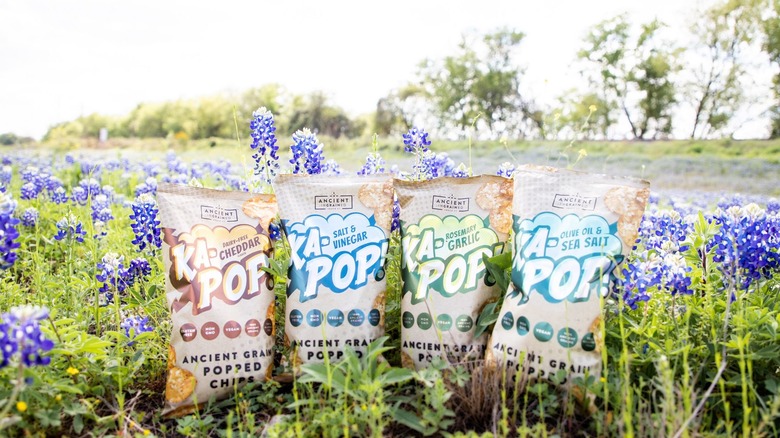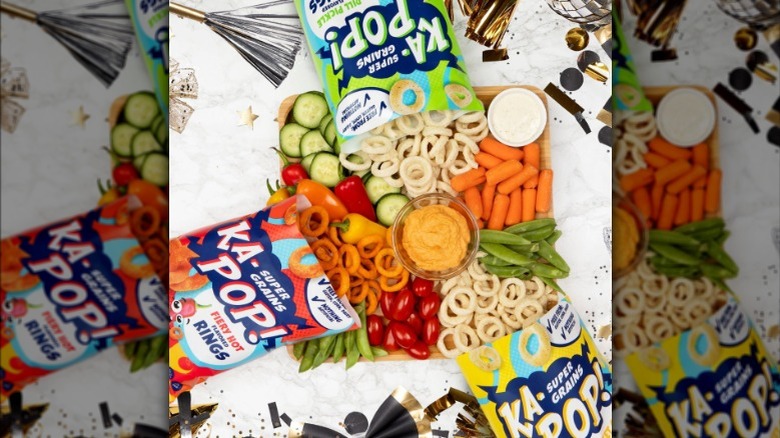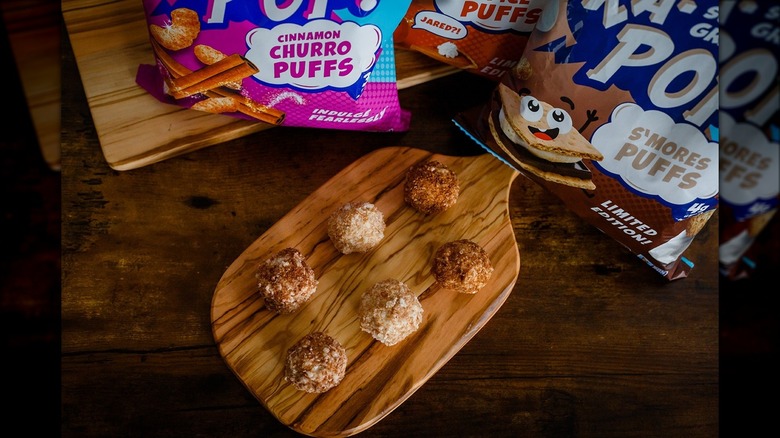The Shark Tank Judges Should've Invested In Ka-Pop!
How does an entrepreneur pitch on "Shark Tank" receive overwhelmingly positive feedback, and still walk away without a deal? Dustin Finkel, the CEO and founder of Ancient inGRAINed, appeared on Season 11 Episode 12 of the show and somehow did exactly that, offering the judges a delicious opportunity: For only $350,000, those millionaire and billionaire Sharks could've earned 5% of his sorghum chip startup with his brand line Ka-Pop!.
For those unfamiliar with sorghum, it's an ancient grain — the term for cereal crops thought by many to be more nutritious and better for the ecosystem than most of our modernly modified grains. Basically, they're perfect for people who feel that "natural" equals "healthy," a trend in present-day wellness diets.
However, the Sharks had some caveats. "Shark Tank" investors Barbara Corcoran and Lori Greiner (otherwise known as the "Queen of QVC") both felt there was nothing they could actually offer the business. Fellow investor Mark Cuban seconded this and claimed that Finkel oversold his idea. Making matters worse, Guest Shark Rohan Oza declared the venture was too young, with too many challenges ahead. Only Kevin O'Leary remained.
O'Leary didn't care about the risks. He didn't have ancient grains in his portfolio and he craved them — though he also pointed out he felt the equity was too low, and subsequently called the valuation "crazy." So "Mr. Wonderful" made a counteroffer that would've lowered the company's valuation by $5 million. Finkel tried to negotiate, but to no avail. All the Sharks bowed out.
Sorry to (ka-)pop(!) the Sharks' bubble, but they made the wrong call.
Ka-Pop! was truly worth millions
It was a twist nobody could've seen coming. The Sharks applauded the pitch. Barbara Corcoran called Dustin Finkel "one hell of a salesman," and Lori Greiner revealed she personally was sold on the chips themselves. Mark Cuban praised Finkel's intelligence and work ethic, and Rohan Oza promised he'd hire Finkel to run any one of his companies at any time. Even Kevin "Mr. Wonderful" O'Leary admitted that Ka-Pop! was undeniably good, despite his apathy for unhealthy snacks.
On those counts, the Sharks were right — but at the same time, they seemed to miss the other upsides. Ka-Pop! snacks are vegan and free of allergens, empty calories, gluten, and GMOs; they also have plenty of antioxidants, minerals, proteins, and whole-grain fiber. These are all things countless health-minded individuals would pay for.
Finkel is obviously a proven entrepreneur: His personality pops. The entrepreneur's passion was on full display while discussing Ka-Pop! chips, and the Sharks were literally "wowed" by his claims of extremely high sales rates for his past ventures. Indeed, with experience in the food industry, investment banking, and brand startups, Finkel's resume appears unimpeachable — especially once you realize he launched the country's premiere gluten-free product.
As far as the business itself, annual sales at the time the episode was filmed were projected to be over $1 million with impressive gross margins. Pre-existing investors included former heads of Boulder Brands, Pacific Foods, and Whole Foods. So, Oza's declaration that Ka-Pop! wasn't ready to scale? Clearly false. Mr. Wonderful's claim the valuation was embellished? Numerous industry insiders disagree.
Ka-Pop! has proven its potential
Humble yet driven, Dustin Finkel left the Tank heartbroken yet satisfied, thanks to the Sharks' rave reviews. Despite the outcome of it all, he remained determined to push forward, and it paid off. These days, shoppers can buy various Ka-Pop! chips, rings, and puffs through its website in flavors like BBQ, cinnamon churro, pumpkin spice, and more. Customers can also find these products at huge retailers like Amazon, Walmart, and QVC (that's right, the very network that launched Lori Greiner pre-"Shark Tank"). It doesn't end there, either. A look at the brand's current store locator reveals its wares are carried by retailers all across the United States. Talk about an underdog success story!
Does this mean some of the Sharks were right to say they had nothing of value to offer Ka-Pop!? Not quite. According to a press release from late 2020, Ka-Pop! had to adjust its marketing strategy to both deal with its exponential growth and survive the fluctuating shopping habits of the pandemic. According to an interview Finkel did with the Daily Camera, the effects of such unprecedented times also forced the venture to rebalance its books and merge with another company.
The "Shark Tank" judges couldn't have predicted COVID-19, no — but some of the Sharks certainly could have helped advise the startup on non-pandemic-related decisions. Any good investor knows to always expect the unexpected. Regardless, it was announced a growth equity firm decided to invest in Ka-Pop! as recently as the summer of 2021, which means there may no longer be room for any Sharky investments. Their loss.


